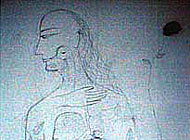
Switzerland offers temporary creative home to artists from abroad

A group of Swiss artists and art lovers has joined forces to establish a unique on-line platform designed to attract their international counterparts to spend up to six months at one of dozens of workshops and galleries around Switzerland.
Until now, say those behind the new cultural initiative, foreign artists have had few opportunities to spend time in Switzerland and little access to information about galleries offering space to artists from overseas.
Wenzel Haller, an artist based in the city of Aarau and one of the coordinators of the website, says cultural exchange has come to mean only the exchange of collections of paintings between one country and another.
“We think it’s sad that cultural exchange today has been largely reduced to the import of paintings for exhibitions – just things which are very easy to arrange,” Haller told swissinfo.
“What we would really love to see is more people, more artists coming to Switzerland,” he added.
Online gateway
The new website, called “Artists in Residence”, functions as an on-line gateway to Swiss galleries and studios and also offers tips and advice to artists considering a stay in Switzerland about how to proceed with their applications.
The project has the endorsement and financial support of both the Federal Culture Office and the Swiss Arts Council, Pro Helvetia.
Organisers hope the new website will bring together galleries which have until now operated their own independent exchange programmes.
One of the busiest centres for international art in Switzerland is located in Aarau, where Haller has already invited dozens of painters and sculptors from India, Belarus, Vietnam and the Palestinian territories to become official artists in residence.
He is keen to see the development and coordination of this kind of inter-cultural exchange on a national level.
“For us, it’s very important that there are human beings coming to experience another culture in Switzerland. I think even Swiss artists and the general public can benefit from having foreign artists here,” Haller said.
Local community benefits
“We recently hosted a female artist from Bangalore in our studio for six months. At first she was very insecure here, but ultimately her stay became a very important part of her artistic career. And the people of Aarau were able to come along to the studio and find out what a young Indian artist is doing today.”
Henry Levy, one of the coordinators of the Artists in Residence project, runs his own art foundation in Zurich and is convinced that such exchange programmes mark an important stage in the development of an artist’s creative talents.
“The more experience an artist has, or the more he has travelled, the more interesting his work can become,” Levy told swissinfo.
The element of culture shock, says Levy, is part of the artist’s journey of exploration from one cultural environment to another.
“There is of course a culture shock, but this shock can be a very positive thing for an artist because it can make him rethink the way he wants to work and what he wants to do,” Levy said.
Levy stresses that this kind of inter-cultural cooperation between Switzerland and the rest of the world is just as significant as cooperation and aid traditionally offered by the Swiss government to nations which suffer from natural disasters.
Handing out cash
“I would say this kind of cultural assistance is far more important than simply handing out cash during times of catastrophe,” Levy says.
“With disaster relief, the Swiss always expect to get their money back. The same thing happened with the United States, which was very generous after the [Second World] War, but which made quite sure that every bit of help that it gave it would get back – and the English were no different.”
Foundations which offer cultural assistance, Levy says, do not expect to be compensated financially in return. “The values that are important to the real artist are not material values.”
Swiss artists have for several decades taken part in residency programmes overseas, and the Artists in Residence project is an attempt to redress the balance.
Mark Bundi, a Swiss painter who has worked as an artist in residence in several countries, says the experience of another culture is an integral part of the creative process.
“It’s very important as an artist to move around and see other cultures,” said Bundi, “because we need this kind of inspiration.”
Bundi recalls in particular the warm welcome he received from his Bulgarian counterparts during a six-month residency programme in Sofia.
“The art scene was very welcoming, which was completely different to the situation in Switzerland, where we are all very busy and have no time because we are constantly running after money,” Bundi notes.
If art is the key to understanding society, Bundi argues, programmes of cultural exchange can give artists a new perspective on both their work and the environment in which they live.
“So in these days following the terrorist attacks on Manhattan, if an artist goes to an Islamic country, for example, he is likely to understand the culture and come to a judgement which is far more sensitive than the general judgements we read in the newspapers.”
by Ramsey Zarifeh

In compliance with the JTI standards
More: SWI swissinfo.ch certified by the Journalism Trust Initiative






























You can find an overview of ongoing debates with our journalists here . Please join us!
If you want to start a conversation about a topic raised in this article or want to report factual errors, email us at english@swissinfo.ch.